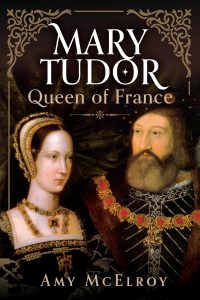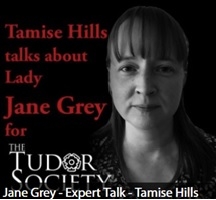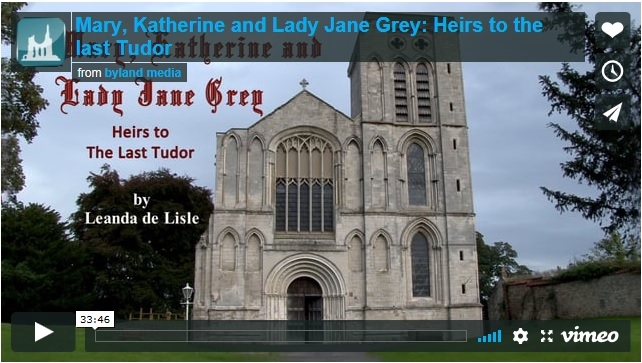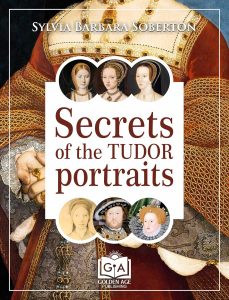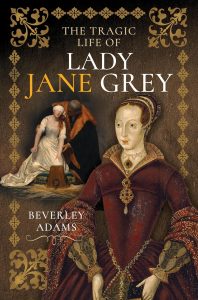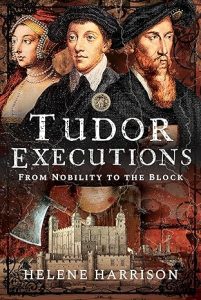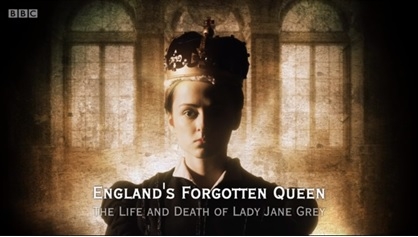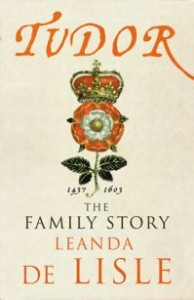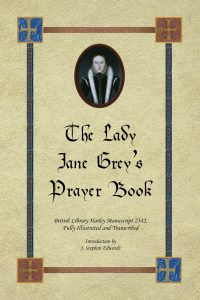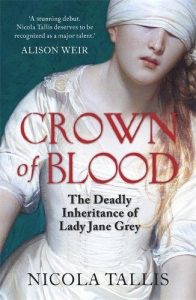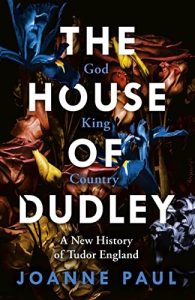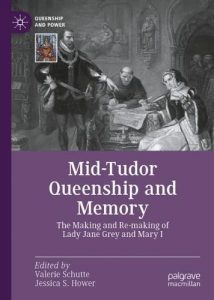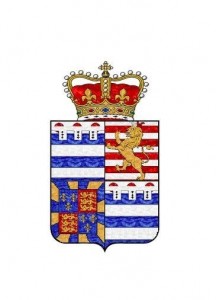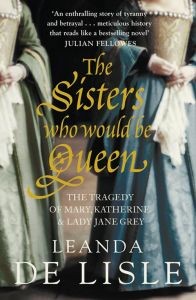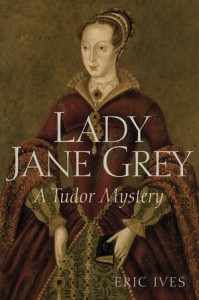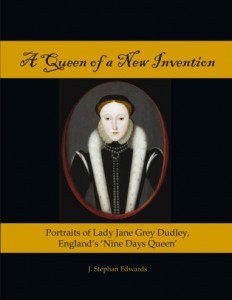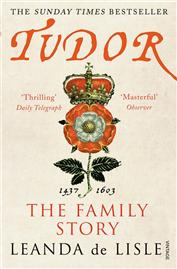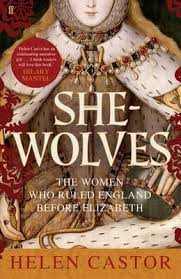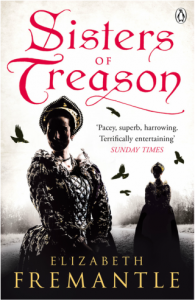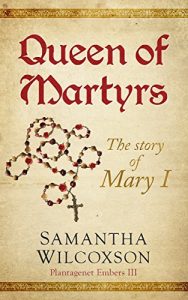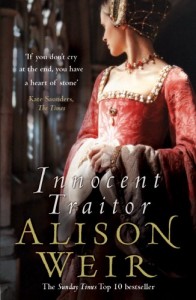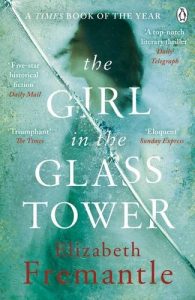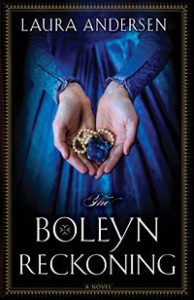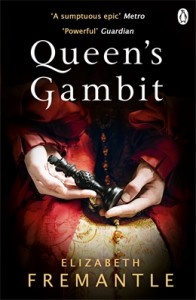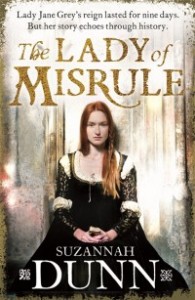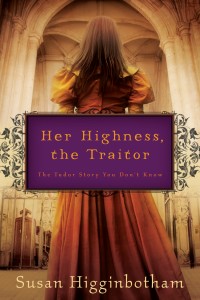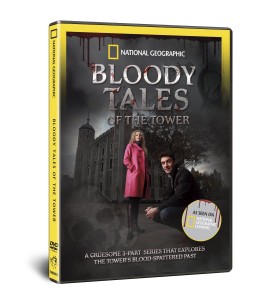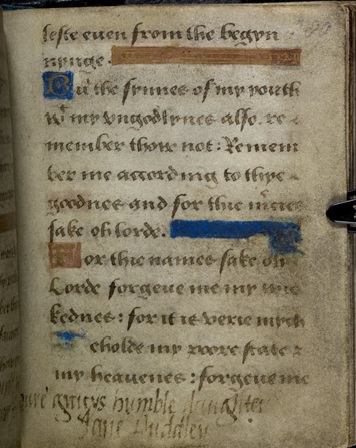Professor Eric Ives writes the following about the authenticity of Jane’s dialogue with Dr Feckenham.
‘Seven other pieces attributed to Jane are known only in printed copies. They come from her months of imprisonment in the Tower and cannot automatically be taken as genuine…Also lengthy is an account of the discussion Jane had with John Feckenham, a Benedictine monk sent to convert her before she was executed.’ (p.17, Ives)
‘…Suspicion might also appear to rest …on the account of her debate with John Feckenham. The government was intent on restoring Catholicism and these items were highly subversive, so how could they have escaped Tower security? But they clearly did because both texts were circulating barely a month after her execution. In a letter smuggled out to Bullinger and dated 15 March, a John Banks (part of the Grey circle) sent news of Jane’s death and Latin translations of the Feckenham dialogue and the letter to Harding and also the scaffold speech and the letter to Katherine Grey. Clearly he had publication in mind but Bullinger vetoed the idea for fear of exasperating Mary’s government still further. However, James Haddon, once a chaplain to Jane’s father, did assure Bullinger that although parts of Bank’s account were suspect because ‘he has gathered them from common report and being himself too in some measure biased by his zeal; when it comes to ‘what regards the Lady Jane herself, and what is said in her name, (as for instance, her exhortations to a certain apostate, and her discourse with Feckenham), I believe and a partly know, that it is true, and did really proceed from herself.’ Thanks to Banks and this comment by Haddon, the authenticity of the Feckenham and Harding pieces, and by association the Katherine Grey letter and the scaffold speech is beyond question.’ (p.21, Ives)
Ives describes how the dialogue appeared in print in England.
‘In 1554 there appeared An Epistle of the Ladye Jane, a righte virtuous woman to a learned man of late fallen from the truth, conjecturally from the press of John Day…In the same year or the next came ‘Here in this booke ye have a godly Epistle made by a faithful Christian.’ Each pamphlet contains an English text of the Feckenham discussion and the letter to the ‘apostate’ which Haddon had warranted, plus the letter to Katherine and the speech from the scaffold which Banks had translated for Bullinger.’ (p.21, Ives)
Professor Ives, also points out that although ‘Foxe’s Acts and Monuments later gave wide circulation to all four documents…these earlier texts are highly significant. An Epistle states that the Feckenham discussion was printed ‘even word for word, her own hand being put thereto’ and ends ‘By me Jane Dudley,’ indicating that the copy the printer was setting had been signed by Jane. Herein this book has ‘which she wrote with her own hand’ and closes with ‘she subscribed thus, Jane Dudley.’ In other words, the respective printers were claiming to set from a copy which was or was taken from Jane’s own autograph. (p.21-22, Ives)
Sent by Queen Mary to try to save Jane’s soul, after his first visit Dr Feckenham obtained a three day reprieve in order to attempt this. There is some disparity over the dates of his first visit and their debate. Ives writes that ‘Here in this Booke’ dates the dialogue with Feckenham ‘(his second visit) ‘two days before she suffered death’ (i.e. Saturday 10th February), while An Epistle dates it as four days before.’ (p.296, note 53, Ives)
Professor Ives argues that it was ‘during her months in the Tower that Jane revealed more about herself than ever before’ and that ‘she wrote from passion and conviction, bringing us closer to the real girl than anything bar her speech from the scaffold.’ (p.253, Ives)
Both de Lisle and Ives agree that Jane wanted her dialogue with Feckenham to be published, ‘Given the little time she had to write between his final visit and the end, this says much of her determination that her death should have meaning. (p.257, Ives) De Lisle suggests that perhaps ‘Jane had not forgotten Anne Askew, burned for heresy by Henry VIII in 1546, and whose arguments with her persecutors had been recorded for posterity. Jane intended to preserve the best of her exchanges also.’ (p.146, de Lisle)
A Conference, dialogue-wise, held between the Lady Jane Dudley and M.Feckenham
‘Feckenham: What thing is required in a Christian?
Jane: To believe in God the Father, in God the Son, in God the Holy Ghost, three persons and one God.
Feckenham: Is there nothing else required in a Christian, but to believe in God?
Jane. Yes: We must believe in him, we must love him, with all our heart, with all our soul, and all our mind, and our neighbour as ourself.
Feckenham: Why then faith justifieth not, nor saveth not?
Jane: Yes, verily, faith (as St. Paul saith) only justifieth.
Feckenham: Why St. Paul saith, if I have all the faith of the world, without love, it is nothing.
Jane: True it is, for how can I love him I trust not, or how can I trust in him whom I love not; faith and love ever agree together, and yet love is comprehended in faith.
Feckenham: How shall we love our neighbour?
Jane: To love our neighbour, is to feed the hungry, clothe the naked, and to give drink to the thirsty, and to do to him as we would do to ourselves.
Feckenham: Why, then it is necessary to salvation to do good works, and it is not sufficient to believe?
Jane: I deny that, I affirm that faith only saveth; for it is meet for all Christians, in token that they follow their master Christ, to do good works; yet may we not say, nor in any wise believe, that they profit to salvation: for although we have done all that we can, yet we are unprofitable servants, and the faith we have only in Christ’s blood and his merits, saveth.
Feckenham: How many Sacraments are there?
Jane: Two: the one the Sacrament of Baptism, and the other the Sacrament of the Lord’s Supper.
Feckenham: No, there be seven Sacraments.
Jane: By what Scripture find you that?
Feckenham: Well, we will talk of that hereafter: but what is signified by your two sacraments?
Jane: By the Sacrament of Baptism I am washed with water, and regenerated in the spirit, and that washing is a token to me that I am the child of God: the Sacrament of the Lord’s Supper is offered unto me as a sure seal and testimony, that I am, by the blood of Christ which he shed for me on the cross, made partaker of the everlasting kingdom.
Feckenham: Why, what do you receive in that bread: do you not receive the very body and blood of Christ?
Jane: No, surely, I do not believe so: I think at that supper I receive neither flesh nor blood, but only bread and wine; the which bread when it is broken, and the wine when it is drunk, putteth me in mid how that for my sins the body of Christ was broken, and his blood shed on the cross, and with that bread and wine I receive the benefits which came by breaking of his body, and by the shedding of his blood on the cross for my sins.
Feckenham: Why, but madam, doth not Christ speak these words: take eat, this is my body: can you require any plainer words: doth he not say, that it is his body?
Jane: I grant he saith so; and so he saith likewise in other places, I am the vine, I am the door, it being only but a figurative speech: doth not St. Paul say that he calleth those things which are not as though they were? God forbid, that I should say that I eat the very natural body and blood of Christ: for then either I should pluck away my redemption, or confess there were two bodies, or two Christ’s: two bodies, the one body was tormented on the cross, and then if they did eat another body, how absurd: again, if his body was eaten really, then it was not broken upon the cross (as it is doubtless) then it was not eaten of his disciples.
Feckenham: Why, is it not as possible that Christ by his power could make his body both to be eaten and broken, as to be born of a woman without the seed of man, and as to walk on the sea having a body, and other such like miracles, which he wrought by his power only?
Jane: Yes, verily, if God would have done at his last supper a miracle, he might have done so: but I say he minded nor intended no work or miracle, but only to break his body, and shed his blood on the cross for our sins: but I beseech you answer me to this one question; where was Christ when he said, take, eat, this is my body: was not he at the table? when he said so he was at that time alive, and suffered not till the next day; well, what took he but bread? and what broke he but bread? and what gave he but bread? look what he took he brake, and look what he brake he gave, and look what he gave that did they eat, and yet all this while himself was at supper before his disciples, or else they were deceived.
Feckenham: You ground your faith upon such authors as say and unsay, both with a breath, and not upon the church, to whom you ought to give credit.
Jane: No, I ground my faith upon God’s word, and not upon the church: for if the church be a good church, the faith of the church must be tried by God’s word, and not God’s word by the church: neither yet my faith: shall I believe the church because of antiquity? Or shall I give credit to that church which taketh away from me a full half part of the Lord’s Supper, and will not layman receive it in both kinds, but the priests only themselves, which thing if they deny to us part, they deny us part of our salvation? and I say, that it is an evil and no good church, and not the spouse of Christ, but the spouse of the devil, which altereth the Lord’s Supper, and both taketh from it, and addeth to it: to that church I say Go will add plagues, and from that church will he take part out of the Book of Life: you may learn of St Paul, how he did administer it to the Corinthians in both kinds, which since your church refuseth, shall I believe it? God forbid!
Feckenham: That this was done by the wisdom of the church, and to a most good intent to avoid an heresy, which then sprung in it.
Jane: O, but the church must not alter God’s will and ordinances, for the colour or gloss of a good intent: it was the error of King Saul, and he not only reaped a curse, but perished thereby, as it is evident in the Holy Scriptures.
To this M. Feckenham gave me a long, tedious yet eloquent reply; using many strong and logical persuasions, to compel me to have learned to their church: but my faith had armed my resolution to withstand any assault that words could then use against me. Of many articles of religion we reasoned, but these formerly rehearsed were the chiefest and most effectual.’
Jane Dudley
(p.34-40, Nicolas)
Sources
De Lisle, L. (2009) The Sisters Who Would Be Queen: The Tragedy of Mary, Katherine and Lady Jane Grey, Harper Collins.
Ives, E. (2009) Lady Jane Grey: A Tudor Mystery, Wiley-Blackwell.
Nicolas, N.H Harding, The Literary Remains of Lady Jane Grey: With a Memoir of Her Life, Triphook & Lepard.

